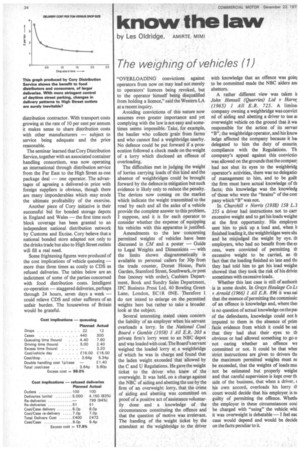know the law
Page 36

If you've noticed an error in this article please click here to report it so we can fix it.
by Les Oldridge, AMIRTE, MIMI
The weighing of vehicles (1)
"OVERLOADING convictions against operators from now on may lead not merely to operators' licences being revoked, but to the operator himself being disqualified from holding a licence," said the Western LA at a recent inquiry.
Avoiding convictions of this nature now assumes even greater importance and yet complying with the law is not easy and sometimes seems impossible. Take, for example, the haulier who collects grain from farms and who cannot find a weighbridge nearby. No defence could be put forward if a prosecution followed a check made on the weight of a lorry which disclosed an offence of overloading.
The difficulties met in judging the weight of lorries carrying loads of this kind and the absence of weighbridges could be brought forward by the defence in mitigation but such evidence is likely only to reduce the penalty. The devices now coming on the market which indicate the weight transmitted to the road by each and all the axles of a vehicle provide the complete answer to this problem, I suppose, and it is for each operator to consider whether the expense of equipping his vehicles with this apparatus is justified.
Amendments to the law concerning permitted weights of vehicles have been discussed in CM and a poster — Guide to Legal Weights and Dimensions — with the limits shown diagrammetically is available to personal callers for 30p from the trade counter, Dorset House, Paris Garden, Stamford Street, Southwark, or post free (money with order), Cashiers Department, Book and Sundry Sales Department, 1PC Business Press Ltd, 40 Bowling Green Lane, London, EC I R ONE. Therefore I do not intend to enlarge on the permitted weights here but rather to take a broader look at the subject.
Several interesting stated cases concern the liability of an employer when his servant overloads a lorry. In the National Coal Board v Gamble (1958) 3 All E.R. 203 a private firm's lorry went to an NBC depot and was loaded with coal. The Board's servant weighed the loaded lorry at a weighbridge of which he was in charge and found that the laden weight exceeded that allowed by the C and U Regulations. He gave the weight ticket to the driver who knew of the overweight. It was held, on a charge against the NBC of aiding and abetting the use by the firm of an overweight lorry, that the crime of aiding and abetting was committed on proof of a positive act of assistance voluntarily done and a knowledge of the circumstances constituting the offence and that the question of motive was irrelevant. The handing of the weight ticket by the attendant at the weighbridge to the driver
with knowledge that an offence was goinl to be committed made the NBC aiders an abettors.
A rather different view was taken ii John Hensall (Quarries) Ltd v Harve_
(1965) 1 All E.R. 725. A limitec
company owning a weighbridge was convict ed of aiding and abetting a driver to use at overweight vehicle on the ground that it wa responsible for the action of its servan "B", the weighbridge operator, and his know ledge affected the company because it ha' delegated to him the duty of ensurin, compliance with the Regulations. Th company's appeal against this convictio: was allowed on the grounds thatthe compan: had not shut its eyes to the weighbridg operator's activities, there was no delegatio of management to him, and to be guilt the firm must have actual knowledge of th facts; this knowledge was the knowledg of those who were the "brains" of the con pany which "B" was not.
In Churchill v Norris (1938) 158 Li 255 a driver had instructions not to carr
excessive weight and to get his loads weighe at the first opportunity. His employer sent him to pick up a load and, when h finished loading it, the weighbridges were sht and he misjudged the weight by eye. th employers, who had no benefit from the e) cess, were convicted of permitting di excessive weight to be carried, as th fact that the loading finished so late and thu they had told him to get his load weighe showed that they took the risk of his drivin sometimes with excessive loads.
Whether this last case is still of authorit is in some doubt. In Grays Haulage Co Lt v Arnold (1966) 1 All E.R. 896 it was sai
that the essence of permitting the commis sin of an offence is knowledge and, where thei is no question of actual knowledge on thepai of the defendants, knowledge could not b imputed to them in the absence of prim facie evidence from which it could be sin that they had shut their eyes to th obvious or had allowed something to go o not caring whether an offence we
committed or not. It could be that whet strict instructions are given to drivers thl
the maximum permitted weights must tit be exceeded, that the weights of loads mu: not be estimated but properly weighe and that careful supervision is kept over th side of the business, that when a driver, ( his own accord, overloads his lorry th court would decide that his employer is tic guilty of permitting the offence. Wheth( the employer in these circumstances coul be charged with "using" the vehicle whi it was overweight is debatable — I feel eac case would depend and would be decide on the facts peculiar to it.












































































